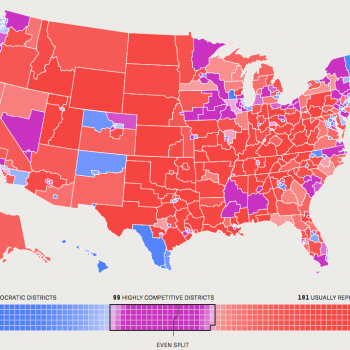
“If you strike me down, I shall become more powerful than you can possibly imagine….” — Obi-wan Kenobi to Darth Vader
The decision is due this Thursday – the Supreme Court is pondering the constitutionality of the Affordable Care Act (“Obamacare”) due to the inclusion of an individual mandate, and it’s highly probable that the decision will be 5-4 strictly along party lines that the law is overturned, in full or in part.
You know, I’m okay with that.
This is not a fight I expected – I assumed that Republicans saw the individual mandate for what it was – a conservative idea, born in conservative thinktanks like the Heritage Foundation, and included in the law as a compromise by Democrats with an eye towards courting Republican support. Conceptually, the individual mandate is identical to Republican policies being promoted by current GOP leadership. The idea that the mandate is unconstitutional is laughable – even George Washington supported mandates. As Ezra Klein writes in The New Yorker, “What is notable about the conservative response to the individual mandate is not only the speed with which a legal argument that was considered fringe in 2010 had become mainstream by 2012; it’s the implication that the Republicans spent two decades pushing legislation that was in clear violation of the nation’s founding document.” Legal scholars are virtually unanimous on the validity of the mandate – and the expectation that it will be overturned anyway.
Put simply, the Supreme Court will engage in naked conservative judicial activism (again) when it rules the ACA invalid. And there will be a consequence.
For one thing, recall that the entire debate about passing health care reform was designed from the beginning by President Obama for compromise. He explicitly took prescription drug prices off the table, and then ruled out any sort of public option for insurance coverage. So at the very outset, Obamacare gave away bargaining positions in the hope of building a bipartisan consensus (which ultimately failed – it passed without a single Republican vote).
So, if the ACA is ruled unconstitutional by conservatives based on the mandate, itself a policy once promoted by conservatives and included in the law to appease conservatives, it’s clear that the lesson learned is: compromise with Republicans is pointless.
Make no mistake: health insurance reform MUST happen. As Klein puts it,
I don’t think it’s particularly controversial to say that the United States of America is, one day, going to have universal or near-universal health insurance. Having 50 million uninsured Americans, 25 million underinsured Americans, and 150 million Americans who are one layoff away from losing their health insurance is not a sustainable long-term equilibrium.
Instead of a gigantic catch-all law like the ACA that trioed to solve all the problems at once, and which could be undermined by Republicans during negotiations (and then killed by an activist SCOTUS anyway after passage), the way forward has to be: a. simple to explain, b. build off something that is already popular, and c. effective at increasing coverage first and foremost. The obvious solution is Medicare for All – allowing anyone to pay insurance premiums to the federal government for Medicare coverage.
Yes, losing the ACA will cause real short-term hardship, and that’s a genuine humanitarian issue. But it’s important to remember that this isn’t a deliberate abandonment of Obamacare in favor of some hypothetical “perfect” outcome. The Republicans are the ones with the initiative here. THEY chose this fight. I’d have preferred we never went down this road at all, but now that we are here, there’s no point in not planning for what’s next. And repealing Obamacare gives Democrats the perfect political leverage to make the case for Medicare for All that they couldn’t have two years ago when it wasn’t yet obvious that compromise and bipartisanship were dirty words as far as the GOP was concerned.
Related: Similar thinking along these lines from Robert Reich, about “health care jujitsu“. And another post at Dean2016 with more links and excerpts.
And here’s a primer on everything you need to know about the Supreme Court and Obamacare in one place.
Further, repeal of the Affordable Care Act might not be the cataclysm that some expect. Also, 11 facts about the Affordable Care Act that everyone should know.











